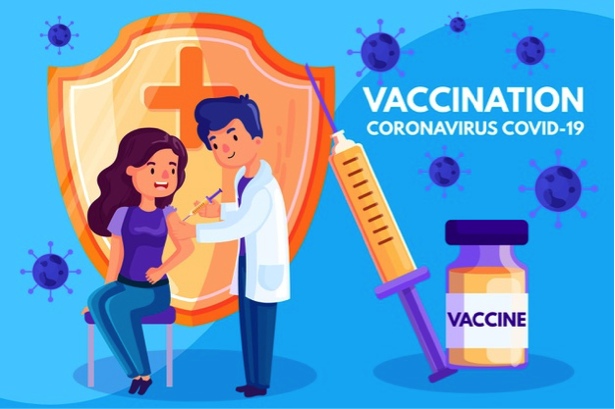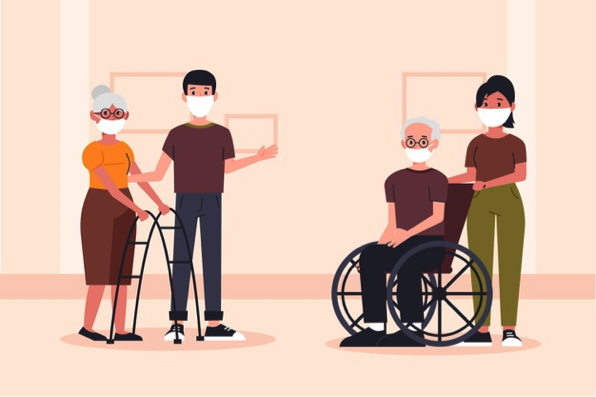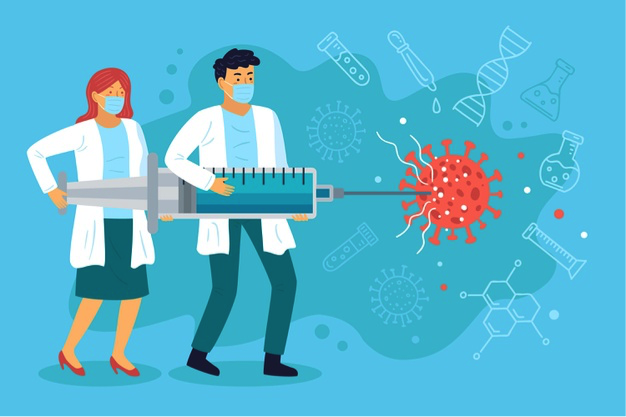Get to Know The Pfizer Vaccine
On November 9th 2020, Pfizer, one of the largest pharmaceutical companies in the United States, issued a press release announcing that the COVID-19 vaccine they are currently developing has an effectiveness of around 90%. This news is certainly very encouraging, given that the development process for the COVID-19 vaccine is relatively short.

Image source: www.freepik.com
Pfizer is working with a German biotech company, BioNTech. This company was founded by Professor Sahin and wife, Dr. Tureci, and has received financial back-up from the Bill & Melinda Gates Foundation. The process of developing this vaccine itself began in January 2020, where Professor Sahin read several scientific journals related to COVID-19 and then he was inspired by the potential of the mRNA drug - previously an anti-cancer drug - which was assumed to be the basis for the development of the COVID-19 vaccine. Not long after, BioNTech succeeded in collaborating with Pfizer and Fosun - a pharmaceutical company in China - to realize the development of the COVID-19 vaccine.
The COVID-19 vaccine from Pfizer is called BNT162b2. This vaccine uses a genetic engineering technology called messenger RNA (mRNA), which aims to see the RNA genome of the Coronavirus. The advantage of mRNA technology is that the vaccine development process does not require a complete virus, so the vaccine development process can be done in a shorter time. Besides that, mRNA technology also uses synthetic genes that are relatively easy to create.
Through mRNA technology, our bodies will not be injected with a vaccine containing dead or weakened viruses, but the vaccine "only" contains a snippet of the viral genetic code that is able to train the immune system to recognize the spike protein on the surface of SARS-CoV-2, but not cause infection in our bodies. As a result, our bodies will be able to produce proteins that can stimulate the immune system response and trigger the formation of strong antibodies that can recognize and prevent viruses from entering the human body cells. In short, the vaccine developed using this mRNA technology can "teach" the immune system to respond without making the body sick, with only a portion of the genetic code for SARS-CoV-2.

Image source:: www.freepik.com
The claim for the effectiveness of the Pfizer Vaccine is said to reach 90%. In fact, the Pfizer vaccine is claimed to be 94% effective in the elderly population (aged over 65 years), who are statistically more susceptible to infection with severe degrees of COVID-19. In general, the elderly population tends not to respond well to vaccination. This claim can be recognized because the clinical trials of the Pfizer Vaccine did use volunteers from various racial, ethnic backgrounds and different age groups.
Even though it was declared to have very good effectiveness, the Pfizer Vaccine still causes several side effects that some volunteers complained about, such as headaches, muscle aches, and feelings of disorientation such as hangovers. However, considering that the side effects complained of are still minor and bearable, especially when juxtaposed with their efficacy, the development of the Pfizer Vaccine is generally still considered very successful.
A little troublesome about this Pfizer Vaccine is that it has to be stored in extremely-cold temperatures - minus 70 - 80 ° Celsius, for several days before it is ready to use. It is feared that the need for this unusual storage area will become a problem in terms of vaccine logistics distribution. This is because not all places are able to provide refrigerators that can provide such temperatures. The average refrigerator is only capable of producing temperatures around minus 4 ° Celsius.
The Pfizer vaccine is planned to be given in two doses, in which the second dose will be given approximately 21 days apart after the first dose. After that, antibody formation is expected to occur approximately 7 days after administration of the second dose.
Pfizer Vaccine is currently in the final stages of its clinical trials. If all goes well, the Pfizer Vaccine will be ready for mass production as early as 2021. Pfizer and BioNTech themselves estimate that they will produce about 50 million doses of vaccine in the first phase of production, which if one person will receive two doses of Pfizer Vaccine, meaning an estimated 25 million people will be able to receive the Pfizer Vaccine in its first phase of production. Furthermore, vaccine production will continue until it is estimated that 1.3 billion doses of Pfizer Vaccine will be produced during 2021.
Regarding distribution permits, Pfizer and BioNTech are currently planning to apply for an emergency permit alias Emergency Use Authorization (EUA) to the Food and Drug Administration (FDA), which will be carried out as soon as the monitoring process for the second dose of injection to volunteers is completed.

Image source: www.freepik.com
What about Indonesia? Is the Indonesian government planning to purchase the Pfizer Vaccine?
Based on the information that has been circulating, Indonesia has committed to purchasing three types of COVID-19 vaccines, namely the Sinovac Vaccine, the Cansino Vaccine, and the Sinopharm Vaccine. In fact, the clinical trial of the Sinovac Vaccine is currently still in the process of clinical trials in Bandung, West Java, and so far no statements regarding the efficacy of the Sinovac vaccine have yet to be reported.
Honesti Basyir, President Director of Bio Farma stated, the basic obstacle for Indonesia to bring in the Pfizer Vaccine is its distribution. As mentioned above, this Pfizer Vaccine requires a special storage area which is very cold. Until today, Indonesia does not have these facilities, therefore if the purchase and distribution is forced, it is feared that the Pfizer Vaccine will arrive in Indonesia in bad condition and will even be dangerous if distributed to public.
Pfizer and BioNTech estimate that the Pfizer Vaccine will be priced at around USD 19.50 per dose, meaning if a person needs two doses, one would have to spend around USD 39.00 to get the complete dose of Pfizer Vaccine. This price is still very reasonable to seek protection from COVID-19, right? Therefore, let's pray together, that the development process of the Pfizer Vaccine and other COVID-19 vaccines can run smoothly, produce good efficacy and guaranteed safety.
Author





 13007
13007



 11 Dec 2025
11 Dec 2025 868 kali
868 kali









